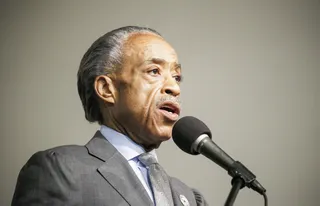A History of African-American POTUS Candidates
From Frederick Douglass to Barack Obama and Ben Carson.

1 / 12
How'd The New Black Guy Do? - This week's Republican debate was the most watched cable program ever with more than 24 million viewers. Everyone was tuned in to see who else Donald Trump would insult (everybody), how Jeb Bush would defend his family's legacy, and the rare sighting of a Black Republican, Ben Carson. Though, Carson isn't the first Black Republican to run, he is one of the few Black people who've even set out for the most powerful seat in the world. Look back. (Photo from left: Mark Wilson/Getty Images, Scott Olson/Getty Images)

2 / 12
Ben Carson Party: Republican - Polls say they want a "rock star" like Obama, Reagan, and Clinton. Carson is more of a nerd, though. The retired pediatrics neurosurgeon has 67 honorary degrees, authored five books, and in 2008 was awarded the Presidential Medal of Freedom by George W. Bush. Reports claim, however, that he's bleeding out staffers and competing with his own super-PACs to raise money. Even more troubling is Carson's "Prescription for America," a platform that embraces far-right values on everything from gay marriage to mandatory minimums. (Photo: Chip Somodevilla/Getty Images)

3 / 12
Jesse Jackson Party: Democratic - The liberal thought leader staged two bids for his party's nomination, in 1984 and 1988, and while he didn't succeed in either, his campaigns were definitely game changers. His Rainbow Coalition embraced all of America's sub-communities, and his drive to register African American voters quite likely paved the way for Obama's win two decades later. (Photo: AP Photo/Ben Margot)

4 / 12
Dick Gregory Party: Peace & Freedom - This St. Louis native and army veteran, who ran for president in 1968, first attempted to unite America through comedy and became one of the first Black comedians to become popular with white audiences. His autobiography, provocatively titled N****r, sold over 7 million copies. He entered politics at the height of the Vietnam era, and ran as an anti-war candidate, encouraging voters to look beyond the two party system and seek out a candidate who "is sensitive to human need." (Photo: Jason Merritt/Getty Images)

5 / 12
Shirley Chisholm Party: Democratic - Already the first Black woman elected to Congress, in 1972 Chisolm became the first Black woman to run for president. Chisolm spent her political career championing the causes of women and minorities, but her presidential bid had a broader goal. "I am not the candidate of Black America, although I am Black and proud," she said in her speech announcing her candidacy. "I am not the candidate of the women's movement of this country, although I am a woman and I am equally proud of that. I am the candidate of the people, and my presence before you now symbolizes a new era in American political history." She ultimately lost her party's nomination to George McGovern, but not before inspiring millions across the country. (Photo: Tom Monaster/NY Daily News Archive via Getty Images)
ADVERTISEMENT

6 / 12
Alan Keyes Party: Republican - This controversial conservative pundit launched two unsuccessful presidential bids. In 1996, he sought the Republican nomination for President but lost to Kansas Senator Bob Dole, and tried again in 2000, when he actually debated several times with John McCain and President George W. Bush. Keyes eventually "settled" for a lucrative career as a political commentator, and has been a vocal critic — to say the least — of President Obama throughout his administration. (Photo: Chris Gannon-Pool/Getty Images)

7 / 12
Carol Moseley Braun Party: Democratic - As the first Black woman elected to Senate, Braun was a political renegade even before she launched her presidential run in 2003. She opposed the war in Iraq and spoke out about the country’s economic situation, but she dropped out of the race in early 2004 and asked her supporters to vote for Howard Dean. (Photo: Rick Scibelli/Getty Images)

8 / 12
Al Sharpton Party: Democratic - The political superstar didn't always just comment on presidential candidates, he once was one himself. The cable television pundit ran for president in 2004 but failed to earn his party's nomination. Sharpton claimed that winning was never his goal, however, and that he ran simply to "change the debate." (Photo: Kena Betancur/Getty Images)
Photo By Kena Betancur/Getty Images

9 / 12
Cynthia McKinney Party: Green - Cynthia McKinney was the first African American woman to represent Georgia in the House of Representatives and the Green Party presidential candidate in 2008, with activist Rosa A. Clemente as her running mate. Though McKinney didn't make it beyond the primaries, her liberal politics, work ethic and iconic braids earned her a cult following among voters. (Photo: Mario Tama/Getty Images)

10 / 12
Herman Cain Party: Republican - After earning degrees from Morehouse College and Purdue University, Cain worked for Coca-Cola and Pillsbury Company and successfully revived the Godfather's Pizza chain. In 2004, Cain blazed a trail in politics, making a failed bid for the Senate. He returned to the political fold in 2011 as a candidate for the Republican presidential nomination. After a triumphant primary season that had him winning several straw polls, Cain dropped out of the race after allegations of sexual misconduct could no longer be ignored. (Photo: PAUL J. RICHARDS/AFP/Getty Images)
ADVERTISEMENT

11 / 12
Frederick Douglass Party: Republican - On June 23, 1888, abolitionist Frederick Douglass received one vote from the Kentucky delegation at the Republican convention in Chicago, effectively making him the first Black candidate to have his name placed in nomination for U.S. president. (Photo: Library Of Congress/Getty Images)
